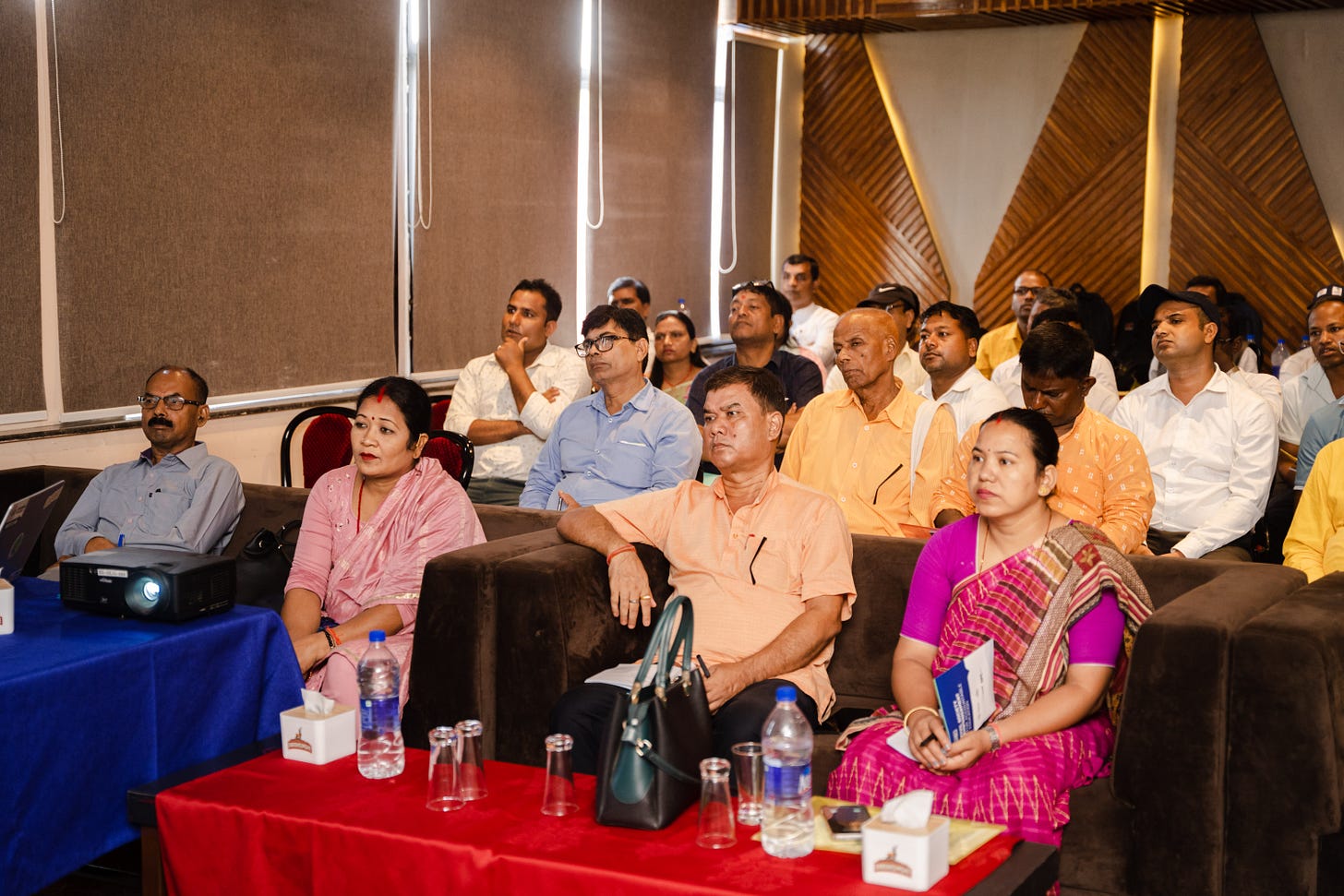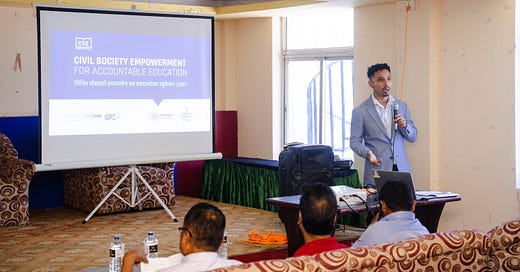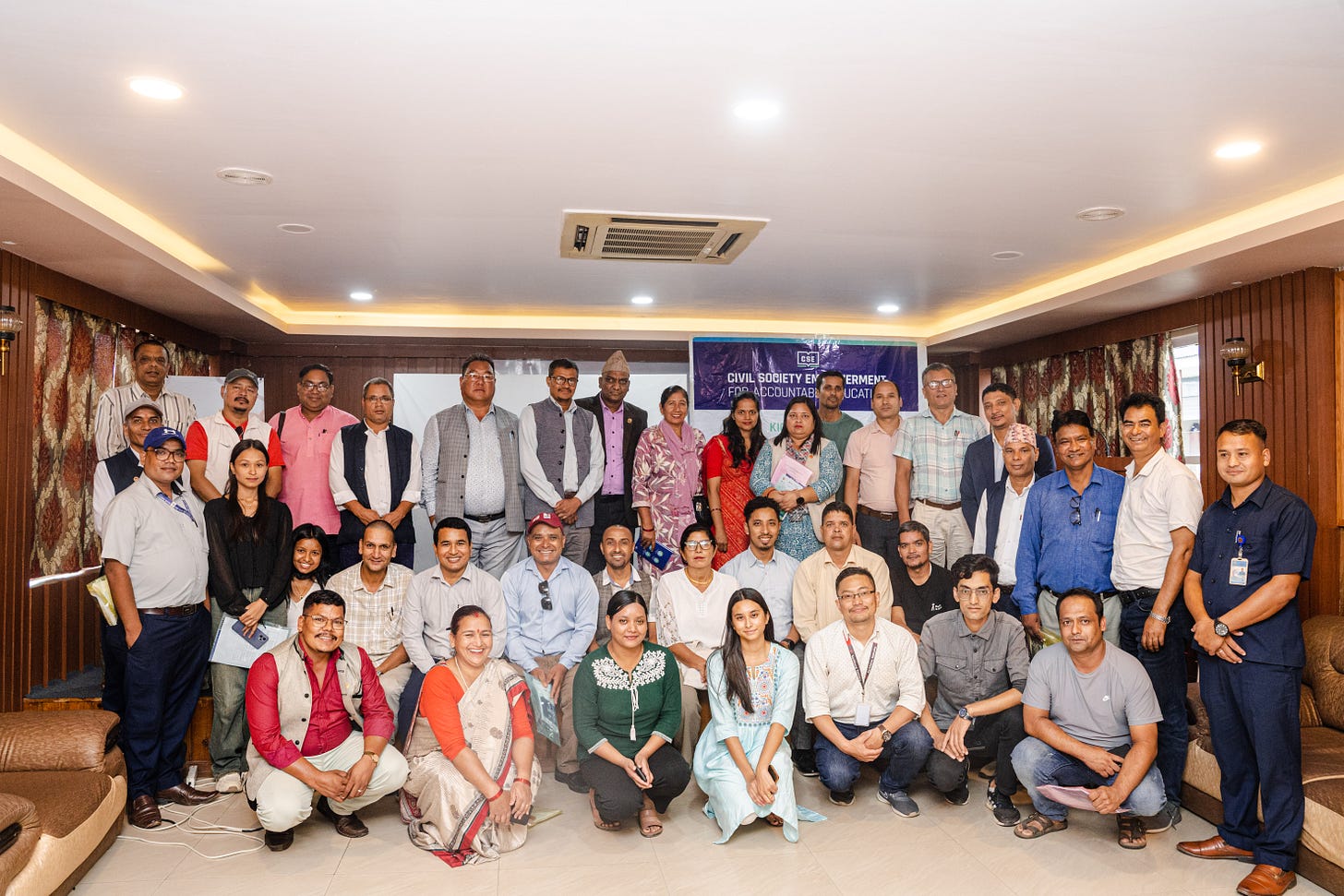CSE Project Kickoff at Madhesh and Karnali Provinces
Civil Society Empowerment for Accountable Education (CSE)
The CSE project promotes civil society engagement to boost transparency, accountability, and inclusivity within Nepal's education sector. Rooted in digital innovation, design thinking, and advocacy, CSE equips Civil Society Organizations (CSOs) with the ability to effectively utilize data for civic mobilization, advocacy, and policy-making. Karkhana Samuha leads this project in partnership with the Dalit Society Service Organization (DSSO) which oversees the Madhesh clusters.
The CSE Project, an initiative to enhance educational outcomes and accountability in Nepal, has progressed significantly since its kickoff event in Kathmandu. Building on the momentum from the Kathmandu event, additional kickoff meetings took place across Madhesh and Karnali provinces in September 2024. These meetings tailored project goals to address specific educational challenges in each province, advancing the initiative’s commitment to meaningful, localized impact
Madhesh Cluster 1: Strengthening Community Feedback and Transparency
On September 10, 2024, the kick-off for Madhesh Cluster 1 took place at Lahan, Siraha district gathering a diverse group of participants, including representatives from the Local Government Units (LGUs), Civil Society Organizations (CSOs), journalists, and prominent community leaders. The meeting focused on educational accountability in the districts of Mahottari and Siraha. Also, this meeting focused on establishing channels for transparent communication between the LGUs and CSOs. Attendees discussed implementing a community feedback mechanism, which would empower parents to report educational concerns directly, thus facilitating a responsive approach to issues in public schools. Participants also emphasized the role of CSOs as active decision-makers, particularly in monitoring budget allocation and resource distribution.
I want to assure everyone that Laxmipur Patari Rural Municipality and all the ward chiefs and representatives are very development-friendly, and we are fully committed to supporting the project discussed today."
Chataranand Thakur
Chairperson, Laxmipur Patari Rural Municipality, Siraha
Madhesh Cluster 2: Building on Community Structures
On September 12, 2024, the kickoff event for Madhesh Cluster 2 at Birgunj, Parsa District, expanded the CSE project’s reach to include participants from Parsa, Bara, and Rautahat districts. This cluster built on the priorities identified in Cluster 1 but focused particularly on strengthening monitoring systems within the community. The discussion concentrated on empowering CSOs to actively monitor attendance, teaching quality, and resource usage. Attendees proposed a quarterly review system where school leaders, Parent Teacher Associations (PTAs), and community members could convene to assess progress, share insights, and develop actionable solutions.
Representatives from Paterwa Sugauli Rural Municipality, Chandrapur Municipality, and Kalaiya Sub-Metropolitan City spoke at the Madhesh kick-off event, highlighting key priorities and questions regarding education policy and local governance. Their remarks emphasized the need for education policies to address local-level realities, and they had expressed dissatisfaction that federal plans often failed to address the specific needs of the community. However, they also reflected a shared commitment to improving education through locally-driven initiatives.

Karnali Cluster: Embracing Cultural Diversity and Inclusivity
On September 26, 2024, the kickoff event for the Karnali Cluster took place at Birendranagar, Surkhet District, and took a distinctive approach by focusing heavily on cultural diversity and inclusivity. This meeting was attended by the Ministry of Social Development (MoSD), Karnali Province, LGUs, CSOs, journalists, and members from various linguistic communities. At the meeting, Mr. Subarna Kumar Khadka from the MoSD, Karnali Province emphasized the need for modernized policies, improved teacher capacity, and better infrastructure to address barriers in education. He highlighted collaboration as key to making education inclusive and driving sustainable development in Karnali.
A central proposal was to introduce dual-language learning materials to accommodate students who speak indigenous languages. The Karnali attendees also committed to exploring professional development programs that equip teachers to deliver culturally relevant education. They highlighted the importance of cultural relevance in education, emphasizing that classrooms should incorporate elements of local culture to make learning more meaningful and engaging for students. The meeting concluded with a resolution to integrate regular training on inclusive teaching practices and to seek funding for culturally aligned educational materials.
Looking ahead, the CSE Project will continue to work closely with its LC members, scaling efforts to reinforce local governance structures, strengthen teacher support, and expand monitoring systems that prioritize transparency. Future phases will include ongoing training programs for educators and SMCs, the development of culturally tailored curriculum resources, and community-driven evaluations to measure progress and adapt strategies.





